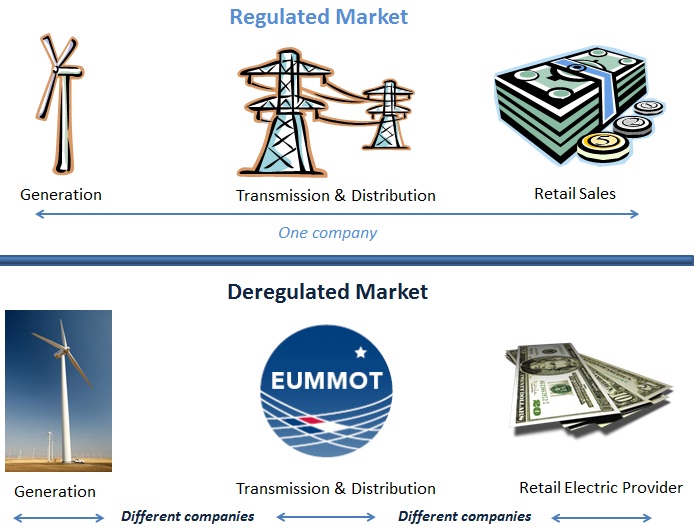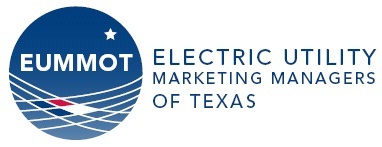Deregulation and the Competitive Electricity Market
Prior to 1999, electric utilities operated as regulated monopolies, providing all parts of electricity service to customers within certain parts of the state. With the passage of Senate Bill 7 during the 76th Legislative Session, these monopolies were broken up into three separate companies, each providing a different aspect of electricity service: power generation, transmission and distribution, and retail sales.
The below image illustrates the difference between a regulated market (which still exists in parts of Texas) and a deregulated market. See below for a description of how the industry currently operates in the deregulated portions of the state.

Power Generation Companies
Power generation companies own and operate power plants, including plants fueled by coal, nuclear power, natural gas, wind, water, solar power, or other renewable sources. Power generation companies sell this power at wholesale to Retail Electric Providers (REPs), who package the power with transmission and delivery service for sale to retail customers. REPs are not permitted under Texas law to own power plants; however, they can be affiliated with a power generation company.
Transmission & Distribution Utility (TDU)
Transmission & Distribution Utilities (TDUs), also referred to as Transmission & Distribution Service Providers (TDSPs) or the “wires companies,” provide the acutal delivery of electricity. The TDUs are responsible for maintaining the poles, wires, and meters that deliver and measure the electricity consumed by a home or business. In addition, the TDUs read the meters and restore service when there is a power outage.
The TDUs are regulated by the Public Utility Commission of Texas (PUC). The PUC sets the rates for transmission and distribution services, establishes reliability and safety standards, and ensures that all customers and REPs are treated the same when it comes to the delivery of electricity to homes or businesses.
TDUs and Energy Efficiency Programs
In addition to deregulation, Senate Bill 7 established an energy efficiency goal, mandating the TDUs to provide energy efficiency programs to offset a percentage of annual growth in demand. As TDUs, the members of EUMMOT have established energy efficiency programs to meet this legislative requirement. These programs are open to residential, commercial and industrial customers within eligible service territories.
For more information on the creation of these programs and how they are administered by each of the EUMMOT member utilities, please see our Program Basics page. To learn more about the current energy efficiency goal and the Energy Efficiency Rule that establishes procedures for meeting the legislative mandate, please click here.
Retail Electric Provider (REP)
Retail Electric Providers (REPs) sell electricity directly to the end-user, whether it is a home or a business. Responsible for customer service and billing, REPs compete for your business by offering a variety of different pricing structures, renewable energy options, added customer service benefits, or other incentives.
Regulated Areas of Texas
Not all areas of the state are open to competition. The Public Utility Commission (PUC) has delayed retail competition for customers of Entergy Gulf States, Southwestern Public Service Company (SPS or Xcel Energy), El Paso Electric Company, and Southwestern Electric Power Company (SWEPCO) because it has determined that there is not adequate competition in the wholesale electricity market for retail competition to work successfully in these areas. Electric cooperatives and city-owned utilities may decide whether their customers will have a choice of REPs. Customers in these areas should contact their electric cooperative or city utility for more information.
